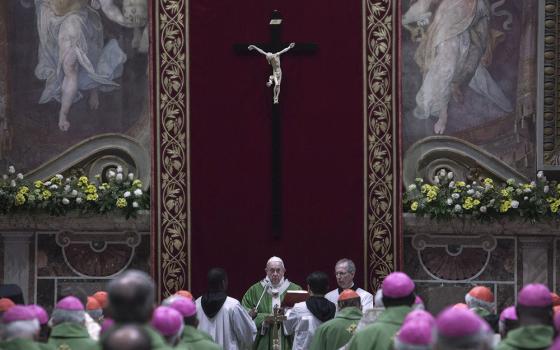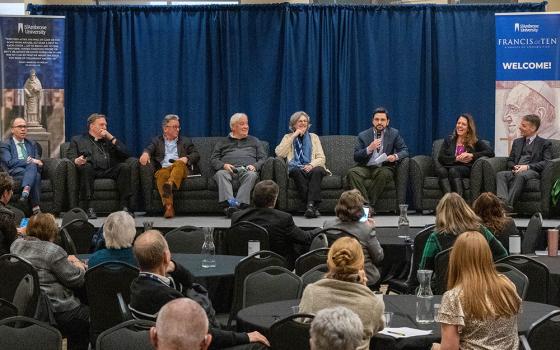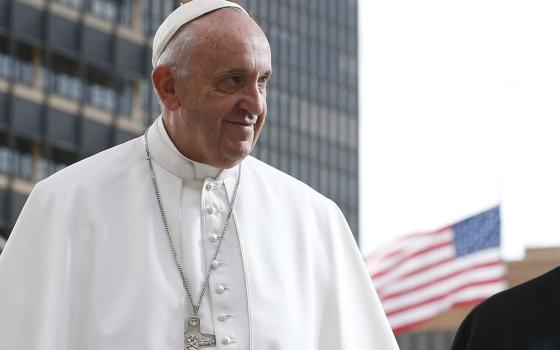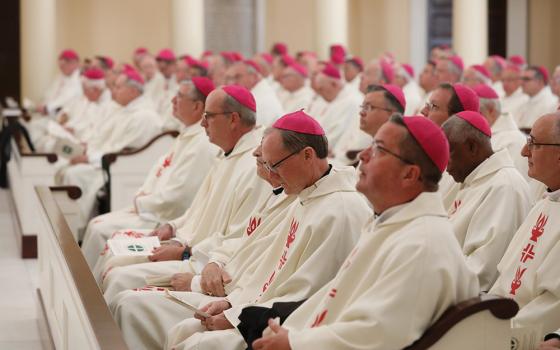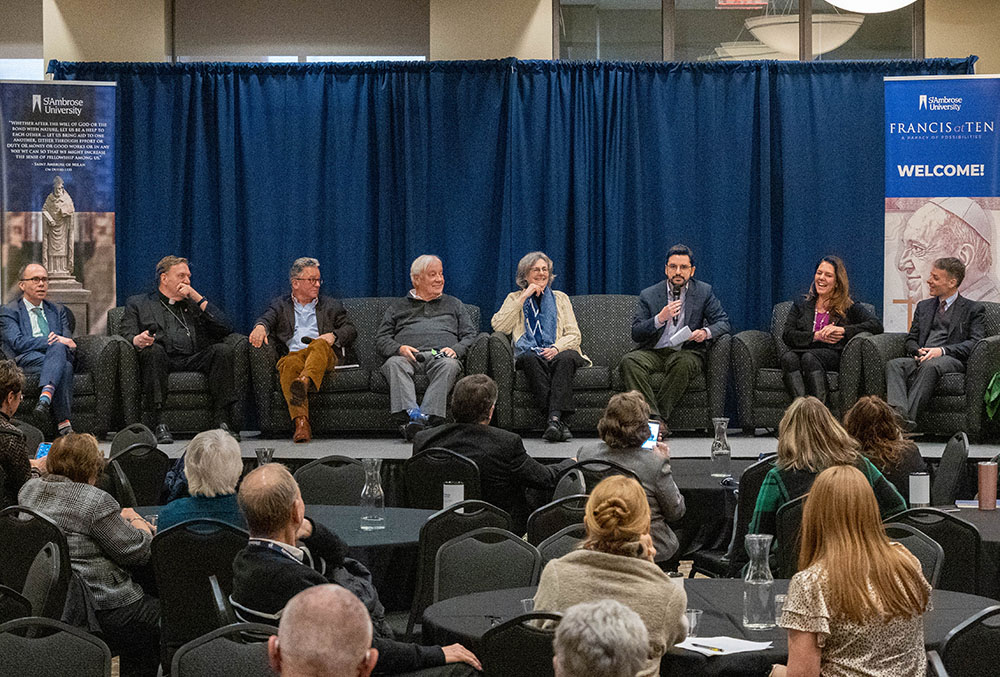
The "Francis at 10: A Papacy of Possibilities" conference at St. Ambrose University in Davenport, Iowa, concludes on March 18 with a panel of all eight keynote speakers. (Courtesy of St. Ambrose University)
Although a number of universities, Catholic organizations and even NCR held events for the 10th anniversary of Pope Francis' election, the only multiday conference in the U.S. dedicated to marking a decade of his pontificate was held in Davenport, Iowa. Nearly 300 people from 17 states and three countries attended the March 16-18 "Francis at 10: A Papacy of Possibilities" conference at St. Ambrose University, while another 100 joined online.
Yes, if you build it, they will come. (OK — I know the "Field of Dreams" is in Dyersville, near Dubuque, not Davenport, but close enough!)
The St. Ambrose event had a celebratory feel, and even included a performance of an original composition commissioned specifically for the event. Composed by St. Ambrose music professor William Campbell, "Venite Exultemus," was sung by the university's Chamber Choir at the opening dinner.
The three-day event featured eight keynote addresses and dozens of workshops, on topics ranging from Franciscan spirituality to an African perspective on the papacy to environmental justice. NCR news editor Joshua McElwee gave a lunchtime talk on "Covering the Pope of Surprises."
Although most speakers and attendees were positive about Francis' papacy, several were critical about parts of his agenda or legacy so far, particularly about the role of women.
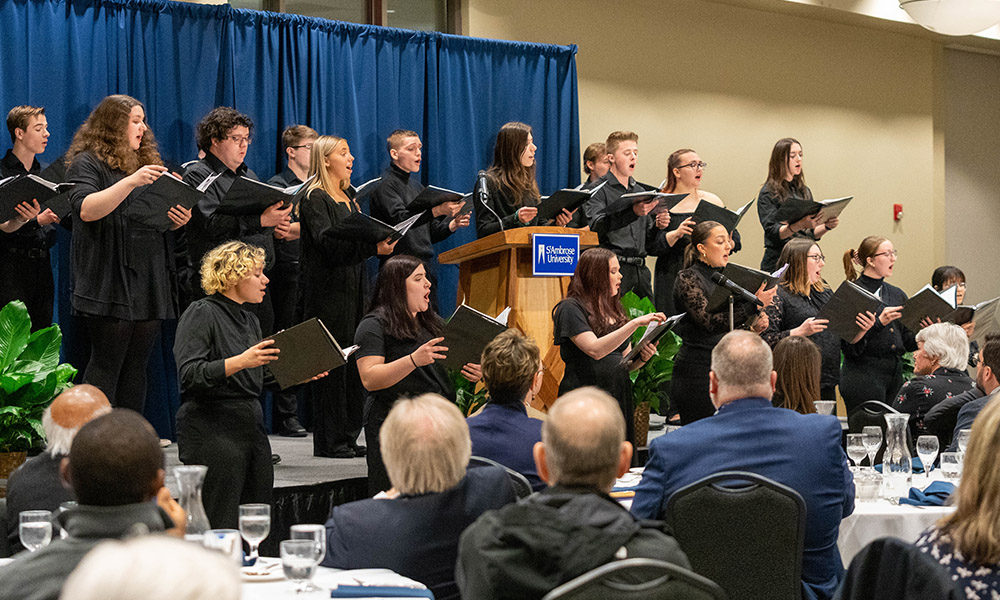
On March 16, the St. Ambrose Chamber Choir performs "Venite Exultemus," an original composition created by music professor William Campbell for the "Francis at 10: A Papacy of Possibilities" conference at St. Ambrose University in Davenport, Iowa. (Courtesy of St. Ambrose University)
Tom Higgins, a 1967 St. Ambrose alum, philanthropist and former state representative who helped organize and underwrite the event, said Francis is "building on the work of Vatican II."
"I love Pope Francis," admitted Higgins in his Thursday evening keynote address. "His papacy has already proven to be transformative. His historic encyclicals, reforms in church governance and transparency, the lifting of those on the margins of society — all of these demonstrate his true leadership."
Higgins (who is related to the famous labor priest Msgr. George Higgins), praised the synodal process, yet said voices in the first listening phase were clear: "Women, who are — after all — more than half of the world's population, must be at the center of the church's mission. They must not suffer continued discrimination in the body of Christ."
Kerry Robinson, partner for global initiatives at Leadership Roundtable, noted that on the issue of women's leadership, "it is under this pontificate that we have been able to measure some progress."
In her keynote on Saturday, Robinson shared how Francis has been a source of inspiration and hope for her. "These 10 years with Pope Francis have felt like a sign of God's providence, and it happened in just the nick of time," she said, given some of the people on the world stage during this past decade.
Tony Annett, author of Cathonomics, pointed out that Francis is in continuity with his predecessors on his critique of market capitalism and the need for governments to protect the poor. "He speaks forcefully and bluntly and with urgency," said Annett. "He can't be tuned out by those who want to ignore these critiques."
Advertisement
In her keynote, Phyllis Zagano highlighted that the Davenport Diocese's synodal report included critical feedback about women's leadership. In the section on the church's image, the report said, "The lack of women's leadership and voice is viewed as a major factor harming the image of the church in society and thus our effectiveness in mission."
The diocese's "58,000 Cups of Coffee" initiative sought to bring in more voices to synod listening sessions by urging each Massgoer to have coffee and conversation with three other people, asking them what fills their heart and what breaks their heart about the church.
Zagano noted other parish and diocesan listening sessions were not so inclusive and made it difficult for people — especially women — to participate. "But even where it appears not to be working, it's working," she said.
Robinson and Zagano both received standing ovations after their keynotes.
In his presentation about synodality, Massimo Faggioli said that, for the sake of his own daughter, he hoped there would be a moment during the synod when young girls are listened to. "I don't know if it will happen," he said.
Faggioli praised the synod process but named several cautions: that it not become part of the "paperwork church" but instead make room for silence and contemplation; that it not be seen as an individual enterprise but a communal one; and that lack of engagement by some in what has become a "two-party church" not be used as a mechanism for further division.
In the end, the synod "is not an adventure," said Faggioli, "it's a home and it's a family."
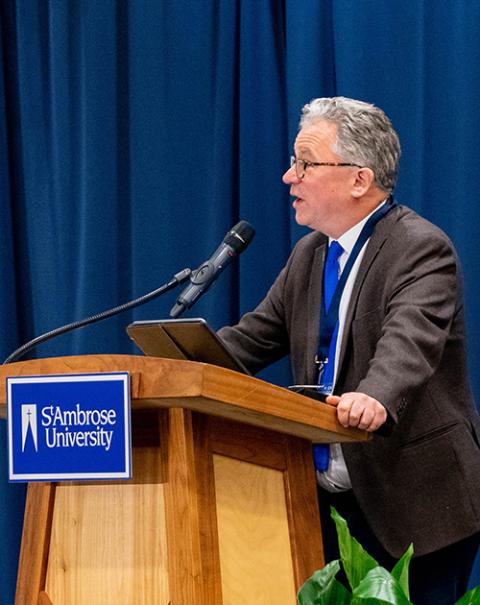
Austen Ivereigh, coauthor with Pope Francis of Let Us Dream, speaks on "Pope Francis' 'Great Reform' 10 years On" at St. Ambrose University in Davenport, Iowa, March 17. (Courtesy of St. Ambrose University)
Austen Ivereigh, coauthor with Pope Francis of Let Us Dream, said that Francis is trying to evangelize the culture and that "a synodal church is an evangelizing church."
Francis insists that the church needs to not just "go out," said Ivereigh, but to "go out from itself." This move from being "self-referential" to evangelizing happens through a culture of encounter and attending to those on the peripheries, as Francis has modeled, he said.
Ivereigh calls this new way of being an evangelizing church "the Francis option."
He said the church's synod on synodality is the "largest exercise of self-transcendence in history," but said the question remains whether the church is capable of such self-transcendence. "Francis has given us a model, but has it made a change at our parish or diocese?"
Cardinal Joseph Tobin of Newark, New Jersey, also challenged those at the conference to the "pastoral conversion" that is the hallmark of Francis' papacy. "We are constantly called to change our minds," the cardinal said in his morning keynote. "And not only do our hearts need to change, but also our structures and strategies."
"The church is neither a spectator sport nor a fast-food restaurant," said Tobin. "We're co-responsible for being church, and structures have to reflect that co-responsibility."
Local Bishop Thomas Zinkula of Davenport attended all three days of the conference, as did apostolic nuncio Archbishop Christophe Pierre and St. Ambrose University's president, Amy Novak. Several keynoters mentioned that they had never been to Iowa before. If St. Ambrose hosts another conference about Francis, I suspect they would be back.




